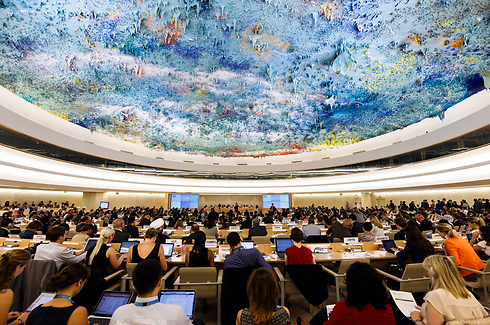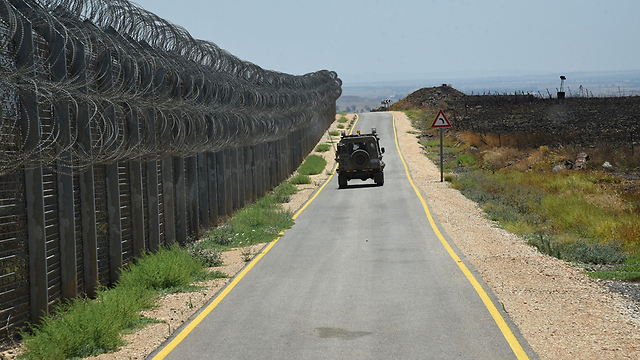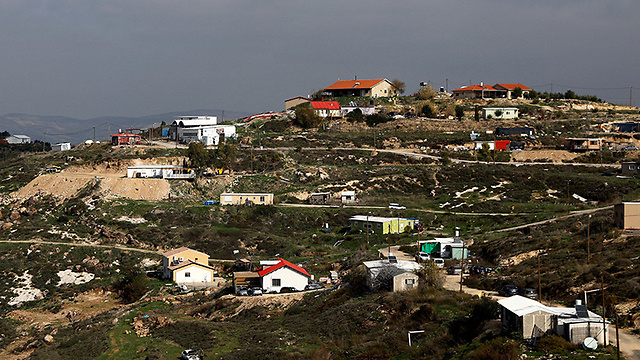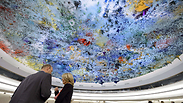
UNHCR accused Israel of forcing citizenship on Golan Druze
United Nations Human Rights Council adopts 5 anti-Israel resolutions, prompting US to again threaten to withdraw from agency; motions call for, inter alia, arms embargo on Israel, end to leniency against hate crimes against Palestinians.
The United Nations Human Rights Council concluded its first and longest session of the year Friday by adopting five resolutions critical of Israel, for which they were soundly criticized by the United States' Ambassador to the UN Nikki Haley.
The council's 47 member states convened Friday to adopt a series of resolutions. Apart from ones relating to North Korea and Mali, the council adopted five lengthy resolutions dealing with the Golan Heights, the status of Palestinians in territories taken in the Six Day War and the actions of Jewish extremists against Palestinians.
The resolutions were passed with 27 members in favor, including Israeli allies such as the United Kingdom, four opposing and 15 abstentions.
The United States once again threatened to withdraw from the UN's top human rights body due to its consistent anti-Israeli stances, with Ambassador Haley tweeting that, "When the Human Rights Council treats Israel worse than North Korea, Iran and Syria, it is the council itself that is foolish and unworthy of its name."
"Today's actions make clear that the organization lacks the credibility needed to be a true advocate for human rights," Haley added.
The Golan Heights
The council reiterated its 1981 Resolution 497 that rejected applying Israeli law to the Golan Heights and determined it had no legal basis, stressing that Israel was systemically in violation of the Security Council's resolution. Among the alleged violations documented were municipal elections, to be held nationwide later this year.
"We denounce the announcement of municipal elections to be held this coming October in four different authorities in the Syrian Golan," the council members wrote, before once against denouncing the Israeli law determining that any withdrawal decision will only be made through a plebiscite, and calling to reconsider the "turbine farm project" and the previously announced construction of 1,600 housing units in the Golan.
The council also contacted UN Secretary-General António Guterres asking him to present Israeli violations to all of the world's government and to the organization's agencies, further calling on all countries to not recognize the Israeli presence in the Golan and its military actions there, including laying down mines along the Syrian border.
The IDF, it should be noted, is constructing a fence in the region to serve as the border with Syria.
Commenting on Druze citizens residing in the Golan Heights, who have been separated from their family members on the other side of the border, the council "expressed deep concern with the suffering of Syrian nationals in the occupied Golan territory."
The council also demanded that Israel allow refugees who escaped to Syria to return to their homes and to their property—since impounded—and called on the country to "stop forcing Israeli citizenship on Syrian residents in the Golan."
"The Syrian populace in the region must be allowed to visit their families through the Quneitra border crossing and with supervision by the International Committee of the Red Cross," the council demanded, stressing that the Israeli prohibition on family reunifications was in contravention of the fourth Geneva Convention.
"The council calls to immediately release Syrian prisoners in Israel jails," the resolution elaborated, "some of whom have been incarcerated for over 30 years. Red Cross personnel should be allowed visitation along with doctors to ascertain their medical conditions."
Right to Palestinian self-determination
The council also discussed a motion presented by the Palestinians along with Bangladesh, Chile, Cuba, Ecuador, Jordan, Venezuela and Pakistan—some of which were stand-ins for Arab and Muslim countries—dealing with violations of the Palestinians' rights to self-determination.
Millions of Palestinian refugees have been uprooted from their homes, the resolution said—half of whom have been living in exile in refugee camps. The council members iterated self-determination was a "fundamental right of all people" and said it was a "necessary prerequisite to bringing peace closer to the region."
Israel, furthermore, has purportedly been "systematically violating Palestinians' natural rights by continuing to build in the occupied territories, and must cease the occupation immediately and strive towards a two-state solution."
On the separation wall, the council expressed "deep concern" over the wall's planned route, which is set to allow the inclusion of most settlement blocs into Israel.
"The settlement enterprise brings about the mass transfer of population from the occupying power to the occupied territories," the resolution continued. "This transfer causes the destruction of homes and projects intended for the Palestinians—some of which received international funding."
The council then called on the world's countries to stop recognizing and assisting the settlement enterprise and the building of the separation wall in the West Bank and east Jerusalem.
According to the document, Israel was forcefully pushing out Palestinian and Bedouin families and expropriated natural resources from them. "Countries should push for Israel to enforce its international commitment," the resolution said.
It further stated that countries should fall in line behind the council's resolutions, and halt all weapons trade with Israel so as not to be considered in collusion with Israeli policy.
'A forgiving attitude towards extremist settlers'
A third resolution scathingly attacked settlers who it said harass Palestinians and damage their property while and also scorning authorities for their allegedly forgiving approach to them.
"The council harshly denounces any act of violence, destruction, harassment and provocation on the part of hard-line Israeli settlers and armed groups against Palestinians in the occupied territories," it said.
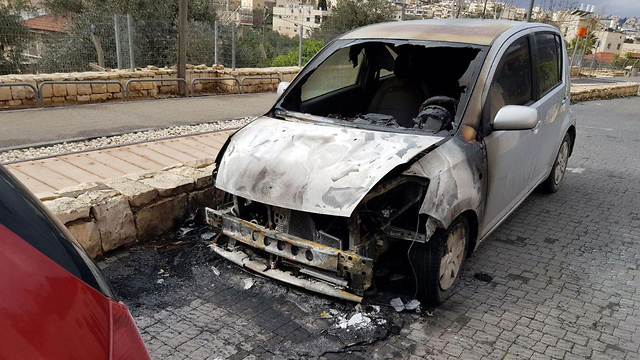
The document noted that instances of violence referred to "harming civilians, properties, agricultural land and historical and religious sites. These are the terroristic actions of single extremists whose age-old purpose is pushing Palestinians out and expanding settlements."
On enforcement regarding the aforementioned cases, the council denounced the allegedly forgiving approach towards activists harming Palestinians, adding, "Israel should investigate these instances and account for each and every one."
Prime Minister Benjamin Netanyahu said in a tweet Saturday night that the resolutions were, "More resolutions detached from reality by the circus of the absurd known as the Human Rights Council." He called to change its name to "The Council for Resolutions Against the Only Democracy in the Middle East."
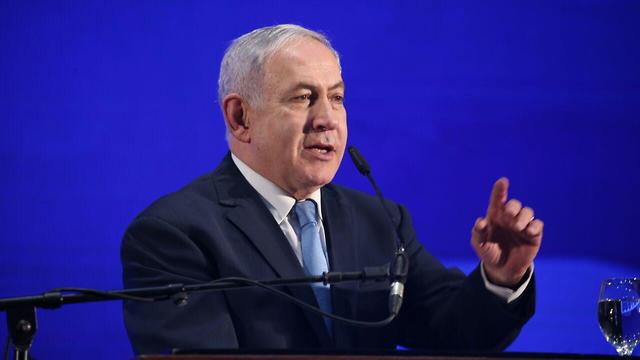
Defense Minister Avigdor Lieberman also commented on the resolutions adopted and said that he had previously led a move to withdraw from the council, which successive governments overturned.
The defense minister added in a tweet that Israel "has no business being in the UN’s Human Rights Council," adding that its "presence there gives legitimacy to …anti-Semitic resolutions, and the farce must end."










